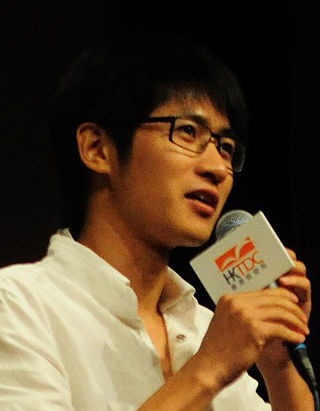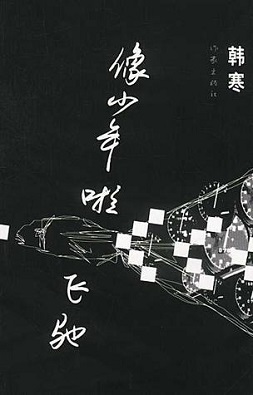
Guo Degang is a Chinese crosstalk (xiangsheng) comedian and actor. Guo's film appearances include The 601st Phone Call, Just Another Pandora's Box, and Mystery. Guo has also directed the films Our Happiness and The Faces of My Gene.
Ling Zhang is a former senior audiologist and fiction writer in Toronto, Canada. She was born in Wenzhou, China and came to Canada in 1986 to pursue her MA in English at University of Calgary. She obtained her second MA degree in Communication disorders at the University of Cincinnati. She has published nine novels and several collections of novellas and short stories in Chinese. One of her novels,《金山》, has been translated into English, French, and German. She has won numerous important literary prizes in China.

Han Han (韩寒) is a Chinese best-selling author, professional rally driver, singer, blogger, director and creator of Party and One He has published seven novels to date, and is represented by the Hong Kong–based Peony Literary Agency. He is also involved in music production. In May 2010, Han Han was named one of the most influential people in the world by Time magazine. In September 2010, British magazine New Statesman listed Han Han at 48th place in the list of "The World's 50 Most Influential Figures 2010". In June 2010, Han Han was interviewed by CNN as China's rebel writer who has become the unofficial voice for his generation.
Shen Haobo is a Chinese poet and publisher, born in 1976 in Taixing, Jiangsu province. He graduated from the Chinese department of Beijing Normal University in 1999.

Don't Stop is the second studio album by Taiwanese singer Jolin Tsai. It was released on April 26, 2000, by Universal and D Sound. Produced by David Wu, Peter Lee, Paul Lee, and Chen Wei, it incorporated genres of pop, R&B, hip-hop, rock, and reggae. Her singing skills on the album were better than before, and her ballad performance became more emotional and delicate, while her dance song performance became more free and easy.

Show Your Love is the third studio album by Taiwanese singer Jolin Tsai. It was released on December 22, 2000, by Universal and D Sound. Produced by David Wu, Peter Lee, Paul Lee, Chen Wei, and Jae Chong, it features a wide range of musical styles and her maturer musical performance.
![<i>Pleasant Goat and Big Big Wolf: The Super Adventure</i> 2009 [[Mainland China]] film](https://upload.wikimedia.org/wikipedia/en/8/8f/The_Super_Snail_Adventure_poster.jpeg)
Pleasant Goat and Big Big Wolf: The Super Adventure, is a 2009 Chinese animated children's comedy film directed by Sung Pong Choo and William Kan. The film was released on January 16, 2009, close to the Chinese New Year holiday. It is the first in a series of films based on the popular Pleasant Goat and Big Big Wolf animated television series and is followed by Pleasant Goat and Big Big Wolf: The Tiger Prowess a year later.

Like a Speeding Youth is a 2002 novel by Chinese writer Han Han. It is Han's third book, and uses Han's traditional writing style, a mixture of humor and satire about society. The novel indicates contemporary Chinese students' as well as lower class workers' confusion and current situation.

Yilin Zhong is a British-Chinese journalist, screenwriter and author. She is the author of seventeen novels, two film screenplays, ten books and many other work including poems and literary reviews. She currently lives in London.
Ma Li is a Chinese actress. She was born on June 28, 1982 in Kuandian Manchu Autonomous County, Dandong City, Liaoning Province. She graduated from the Performance Department of the Central Academy of Drama and the Institute of Drama of Peking University. She is an actress in Mainland China.

1019 I Can Concert is a live video album by Taiwanese singer Jolin Tsai. It was released on March 16, 2000, by Universal and D Sound. It chronicled the 1019 I Can Concert at Nankang 101 in Taipei, Taiwan on December 4, 1999.

Babao seal paste is a traditional handicraft made in Zhangzhou, Fujian, China. It dates to the Qing Dynasty and is honoured as one of Zhangzhou's "Three Precious Treasures". In 1983, its recipe was guarded as "top secret" by the Chinese Ministry of Light Industry. Babao seal paste was added to the National Intangible Cultural Heritage List in 2008 and the China Time-honored Brand list by the Chinese Ministry of Commerce in 2011.

Fu Shiqi, known professionally by his stage name Cheng Yi, is a Chinese actor and singer. He made his television debut in Chinese television drama Beauty World (2011) and graduated from Central Academy of Drama in 2012. He first gained recognition for his role in Noble Aspirations (2016). He is also known for his roles as Yu Sifeng in Love and Redemption, Ying Yuan in Immortal Samsara and Li Lianhua in Mysterious Lotus Casebook.
Jia Ling is a Chinese comedian, crosstalk (xiangsheng) and sketch performer, film actress, producer and director born in Xiangyang, Hubei province.

Like a Flowing River is a 2018 Chinese period drama based on Ah Nai's novel River of Time. It is directed by Kong Sheng and Huang Wei, and stars Wang Kai, Yang Shuo and Dong Zijian as budding entrepreneurs who take advantage of the economic reforms being rolled out in 1970s China.
Hefei No. 8 High School, commonly referred to as Hefei Bazhong, is a public high school in Hefei, Anhui, China.

Ulink College is an educational information consultancy company founded in Shanghai, China. It consists of one partner school (NCPA) and six full-time international boarding high schools across China. The international high schools offers IGCSE and A-Level courses, and the partner school offers Advanced Placement (AP) course. The partner school and international high schools are all taught in English.
The dispute over the nomenclature of Liangshanpo occurred from 2006 to 2009 and was a contentious clash between the Scenic Area Management Committee and the Tourism Corporation of Liangshan County, situated within the province of Shandong, China and the Liangshanpo Tourism Development Co., Ltd. of Dongping County, also in Shandong Province. The former party initiated legal proceedings against the latter, culminating in two rounds of judicial scrutiny. The case concluded when Liangshan County prevailed in its lawsuit.




![<i>Pleasant Goat and Big Big Wolf: The Super Adventure</i> 2009 [[Mainland China]] film](https://upload.wikimedia.org/wikipedia/en/8/8f/The_Super_Snail_Adventure_poster.jpeg)






